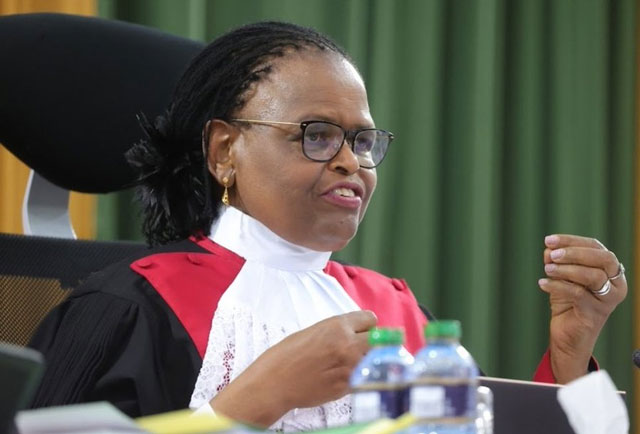
By promoting equitable and representative legal systems, gender-balanced judiciaries are not only improving women’s lives, they are also playing a role in ensuring fair trade practices, boosting investor confidence, and empowering women entrepreneurs.
SPECIAL REPORT | BIRD AGENCY | Female-led apex courts are now driving reforms that analysts say could bolster governance ratings and foreign investor confidence.
In 2004, Rwanda’s Aloysie Cyanzayire shattered a continental barrier, becoming Africa’s first female Chief Justice and spearheading sweeping judicial reforms in a country rebuilding from genocide.
Her tenure not only rebuilt the nation’s judiciary from the ashes of genocide but also set a precedent for women leading apex courts in Sudan, Kenya, and beyond.
Cyanzayire championed judicial independence, strengthened oversight mechanisms, and played a pivotal role in the Gacaca courts—an innovative community-based justice system that processed hundreds of thousands of genocide-related cases.
Three years later, Georgina Theodora Wood took office as Ghana’s first Chief Justice and the second woman in Africa to lead a national apex court.
Her stint, marked by anti-corruption crusades and mobile courts to serve rural communities, set a precedent for judicial innovation.
Over a decade, she turned a sclerotic system into a regional model, prosecuting corruption scandals that reached the presidency and slashing case backlogs by 40%.
In 2015, Justice Wood dismissed 20 judges and magistrates in Ghana after they were found guilty of bribery.
Nearly two decades later, her legacy reverberates across the continent as more women ascend to lead supreme courts, reshaping legal systems once synonymous with patriarchal tradition.
South Africa’s appointment of Mandisa Maya as Chief Justice in June 2024, the latest in a string of historic firsts, continues to signal a structural shift in Africa’s “rule of law” indexes.
Today, at least eight nations — from Kenya to Sierra Leone — have women at the helm of their highest courts, a stark contrast to 2004, when Cyanzayire stood alone.
Martha Koome now presides over Kenya’s judiciary, a position she has held since 2021. Her counterpart Nemat Abdullah Khair, who took charge of Sudan’s judiciary in 2019, and Mabel Agyemang, was appointed Chief Justice of Turks and Caicos the following year.
Lúcia da Luz Ribeiro has been at the helm of Mozambique’s Constitutional Court since 2019, working alongside Meaza Ashenafi, who has led Ethiopia’s Federal Supreme Court since 2018, and Hildah Chibomba, steering Zambia’s Constitutional Court since 2016.
Maria de Fátima Coronel has overseen Cape Verde’s Supreme Court of Justice since 2015, while Kadidiatou Abdoulaye Ly Diori has shaped Niger’s Constitutional Court since 2013.
From Kenya to Sierra Leone, Ethiopia to South Africa, the leadership of women apex judges is driving measurable reforms — accelerating case resolutions, expanding economic opportunity, and redefining public trust in justice.
Legal analyst and advocate Mary Claudio, however, notes that while women judges often enhance public trust, judicial appointments remain deeply political.
“In Kenya for instance, the Chief Justice and other judges are presidential appointees after a competitive selection process and nomination by the Judicial Service Commission,” she explained.
“Still, women’s leadership in justice is viewed as fostering integrity and public confidence, but anyone can be corrupted.”
A UN report in delivered in 2023, however, suggests that women justices have a net positive effect on a country’s rule of law.
“Women are often considered to have more integrity and are difficult to corrupt,” argued judge Mujinga Bimansha Marie Josée in the report.
Kenya’s Koome has become a case study in systemic overhaul. Under her watch, digitised court filings and virtual hearings have slashed average case resolution times from seven years to three, unlocking millions of dollars in stalled capital for businesses in 2023 alone.
Koome’s mandate for trauma-informed procedures in sexual violence cases has halved delays for survivors, while mobile courts in pastoralist regions have resolved land conflicts for thousands of smallholder farmers.
Further, UN studies show courts led by women resolve gender-based violence cases 20% faster on average, according to the International Association of Women Judges—a metric linked to workforce productivity gains.
“Women’s representation in the judiciary is key to ensuring that courts represent their citizens, address their concerns and hand down sound judgments,” stated the report.
“By their presence, women judges enhance the legitimacy of courts, signalling that they are open and accessible to those who seek recourse to justice.” .
It’s not only women who benefit from improved judiciaries.
A 2021 research paper, “Advancing Gender-Equitable Outcomes in African Continental Free Trade Area (AfCFTA) Implementation,” by the United Nations Economic Commission for Africa (UNECA) also emphasises the importance of gender mainstreaming in the AfCFTA.
It states, “Women across the continent are disproportionately affected by deeply rooted gender inequalities and a number of structural barriers to economic empowerment. At the same time, women are transformative agents of economic and social change in African economies.”
For tech firms like Flutterwave, which faced protracted payment disputes in Kenya and which were more quickly resolved thanks to Koome’s reforms, the shift can be existential.
Behind the bench, an institutional scaffolding is emerging. The African Union’s Agenda 2063 ties judicial funding to gender parity targets.
Yet, despite the rise of female chief justices, the overall gender gap in Africa’s judiciary remains significant
A 2023 UN report found that across 10 countries surveyed, women accounted for 40% of judges and magistrates. There were 4,619 women in the judiciary compared to 6,988 men.
However, the distribution is uneven. Algeria, Kenya, Lesotho, and Zimbabwe have women making up more than 50% of their judiciaries. In contrast, Burkina Faso, Morocco, Nigeria, and Sierra Leone report female representation below 30%.
This imbalance reveals a paradox. Women are increasingly leading apex courts, yet lower courts remain largely male-dominated.
Analysts warn that without reforms in judicial appointments and career progression, gender parity in Africa’s courts will remain both uneven and fragile.
***
SOURCE: Seth Onyango, bird story agency
 The Independent Uganda: You get the Truth we Pay the Price
The Independent Uganda: You get the Truth we Pay the Price



